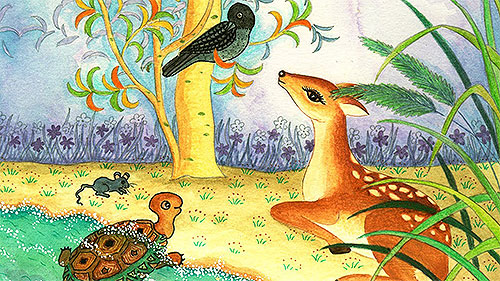SUBHASHITHANI:411
(The mouse)and Laghupatanaka (The crow ) that however rich a person, if he does not enjoy or give charity, he is as poor as any poor person can be. Both the poor and the miserly rich are incapable of enjoying their wealth.
दानं भोगो नाशस्तिस्रो गतयो भवन्ति वित्तस्य – Wealth has three avenues – charity, enjoyment and loss.
When you do not give it away, nor spend it, wealth gets lost, said Mantharaka. 2.154
भवामः किं न तेनैव धनेन धनिनो वयं ॥ १५१ ॥
gṛha-madhya-nikhātena
dhanena dhanino yadi |
bhavāmaḥ kiṃ na tenaiva dhanena dhanino vayaṃ || 2.151 ||
If people are to be considered wealthy just because of wealth that lies buried in the house, why should we not call ourselves rich by that very same wealth? (Both derive very little benefit from it)
उपार्जितानाम् अर्थानां त्याग एव हि रक्षणम् ।
तडागोदर-संस्थानां परीवाह इवाम्भसाम् ॥ १५२ ॥
upārjitānām
arthānāṃ tyāga eva hi rakṣaṇam |
taḍāgodara-saṃsthānāṃ parīvāha ivāmbhasām || 2.152 ||
Giving away in charity is
the best way to protect it; just as releasing the stored water is the best way
to protect the lake.
दातव्यं भोक्तव्यं सति विभवे सञ्चयो न कर्तव्यः ।
पश्येह मधुकरीणां सञ्चितमर्थं हरन्त्यन्ये ॥
Pasyeha madhukareenaam sanchitam artham harantyanye II 2.153
One
should spend (invest) and donate, and never hoard the wealth that is earned. We
can see that the honey hived up by bees ends up being stolen by others.
यो न ददाति न भुङ्क्ते तस्य तृतीया गतिर्भवति ॥ ४३ ॥
dānaṃ bhogo nāśastisro gatayo bhavanti vittasya ।
yo na dadāti na bhuṅkte tasya tṛtīyā gatirbhavati ॥2.154
सर्पाः पिबन्ति पवनं न च दुर्बलास् ते
शुष्कैस् तृणैर् वन-गजा बलिनो भवन्ति ।
कन्दैः फलैर् मुनि-वरा गमयन्ति कालं
सन्तोष एव पुरुषस्य परं निधानम् ॥ १५६ ॥
sarpāḥ
pibanti pavanaṃ na ca durbalās te
śuṣkais tṛṇair vana-gajā balino bhavanti |
kandaiḥ phalair muni-varā gamayanti kālaṃ
santoṣa eva puruṣasya paraṃ nidhānam || 2.156 ||
Snakes
live mostly on air, and are yet not weak. Elephants survive on dried grass, yet
are very strong. Sanyasis live by eating just roots and fruits, yet are always
at peace. Contentment is the highest wealth of man.
सन्तोषामृत-तृप्तानां
यत्
सुखं
शान्त-चेतसाम्
।
कुतस्
तद्-धन-लुब्धानाम्
इतश्
चेतश्
च
धावताम्
॥
१५७
॥
kutas tad-dhana-lubdhānām itaś cetaś ca dhāvatām || 2.157 ||
पीयूषम् इव संतोषं पिबतां निर्वृतिः परा ।
दुःखं निरन्तरं पुंसाम् असंतोषवतां पुनः ॥ १५८ ॥
pīyūṣam
iva saṃtoṣaṃ pibatāṃ nirvṛtiḥ parā |
duḥkhaṃ nirantaraṃ puṃsām asaṃtoṣavatāṃ punaḥ || 2.158 ||
Those who are happy and contented are forever in bliss. Those who are
unhappy and unsatisfied are always in misery.
निरोधाच् चेतसो ऽक्षाणि निरुद्धान्य् अखिलान्य् अपि ।
आच्छादिते रवौ मेघैः सञ्छन्नाः स्युर् गभस्तयः ॥ १५९ ॥
nirodhāc
cetaso 'kṣāṇi niruddhāny akhilāny api |
ācchādite ravau meghaiḥ sañchannāḥ syur gabhastayaḥ || 2.159 ||
When the mind is
restrained, all the organs of senses are also restrained; when the sun is
covered by clouds the rays are also covered.
वाञ्छा-विच्छेदनं प्राहुः स्वास्थ्यं शान्ता मह-र्षयः ।
वाञ्छा निवर्तते नार्थैः पिपासेवाग्नि-सेवनैः ॥ १६० ॥
vāñchā-vicchedanaṃ
prāhuḥ svāsthyaṃ śāntā maha-rṣayaḥ |
vāñchā nivartate nārthaiḥ pipāsevāgni-sevanaiḥ || 2.160 ||
Great sages, who are tranquil, say that peace of mind is obtained by eliminating desires; desires cannot be removed by enjoyment of objects as thirst is not quenched by resorting to fire.
We have similar idea mentioned in Manusmruti and Mahabharata:
हविषा कृष्णवर्त्मैव भूय एवाभिवर्धते ॥ ९४ ॥Manusmruti
na jātu kāmaḥ kāmānāmupabhogena śāmyati |
haviṣā kṛṣṇavartmaiva bhūya evābhivardhate ||2.94 ||
Never is desire appeased by the enjoyment of desires; it only waxes stronger, like fire by clarified butter.

Share wealth and happiness multiplies; blessed is the giver and the receiver. Contentment is the greatest wealth.
ReplyDelete